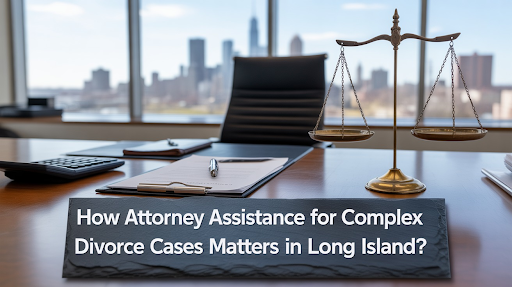How Attorney Assistance for Complex Divorce Cases Matters in Long Island?
Updated: 06 Nov 2025
122

As a resident of Long Island facing a complex divorce case, you’ll find that working with an experienced divorce attorney is imperative. They’ll expertly navigate the nuanced asset division, child custody and support, and spousal support negotiations – helping you achieve an equitable outcome tailored to your unique financial and family situation. To further understand how a Long Island divorce lawyer can make all the difference, let’s dive deeper into the key considerations.
The Complexities of Divorce in Long Island
Why is divorce in Long Island particularly complex? Divorces here often involve high-net-worth individuals with complex financial portfolios and intricate asset divisions. There are also complexities around child custody and support, especially when parents’ careers and lifestyles differ greatly. The area’s high cost of living further complicates matters, as does the prevalence of prenuptial and postnuptial agreements.
Maneuvering Long Island’s unique divorce landscape requires an attorney well-versed in the nuances of local laws and precedents. Chris Palermo, for example, is known for his expertise in handling such challenging cases and can guarantee you protect your interests and rights throughout the process, from property division to alimony negotiations.
The Importance of Experienced Legal Representation
Given the complexities of divorce in Long Island, experienced legal representation is essential.
- Maneuvering the legal system: Divorce laws can be intricate, and an attorney’s expertise can guarantee you comply with all requirements.
- Asset division: Dividing property and finances can be challenging; a lawyer can protect your interests.
- Child custody and support: An attorney can advocate for the best interests of your children.
- Emotional support: Going through a divorce is stressful; a lawyer can provide guidance and emotional support during this difficult time.
Asset Division in High-Asset Divorce Cases
When dealing with high-asset divorce cases, you’ll need to understand the principles of equitable distribution. Accurately valuing complex assets is vital to ensuring a fair division of marital property.
An experienced divorce attorney can guide you through this intricate process and protect your financial interests.
Equitable Distribution Principles
Equitable distribution principles are essential when dividing assets in high-asset divorce cases on Long Island. Your attorney will consider these principles to guarantee a fair and balanced outcome:
- Identifying and valuing all marital assets, including complex investments and businesses.
- Determining each spouse’s contributions, financial and non-financial, to the marriage.
- Considering factors like the duration of the marriage and the parties’ future financial needs.
- Crafting a distribution plan that upholds the principles of fairness and equity, even if it doesn’t result in a 50/50 split.
Adhering to these principles is critical in maneuvering the complexities of high-asset divorce on Long Island.
Complex Asset Valuation
Accurately valuing complex assets is a cornerstone of high-asset divorce proceedings on Long Island. You’ll need an experienced attorney who can navigate the intricacies of evaluating businesses, real estate, investments, and other intricate holdings. They’ll work with financial experts to guarantee proper asset classification and equitable distribution.
Don’t underestimate the challenges – things like private equity interests, intellectual property, and executive compensation can be tricky. Your lawyer will safeguard your rights and interests throughout the complex valuation process, providing the insights you need to achieve a fair outcome.
Navigating Child Custody and Support
Navigating child custody and support during a divorce can be complex. You’ll need to establish arrangements for your child’s care and determine fair support obligations.
Safeguarding your parental rights is essential throughout this process.
Establishing Child Arrangements
Establishing child arrangements can be a complex and emotionally charged process, but you don’t have to navigate it alone. With the help of an experienced attorney, you can guarantee your child’s best interests are protected:
- Determine legal and physical custody: Your attorney will help you understand the different custody options and negotiate arrangements that work for your family.
- Establish a parenting plan: This outlines the schedule, responsibilities, and decision-making processes for your child’s care.
- Address child support: Your attorney will help you calculate the appropriate amount and confirm it meets your child’s needs.
- Modify existing arrangements: If circumstances change, your attorney can assist with modifying custody, visitation, or support orders.
Determining Support Obligations
How do you determine the appropriate child support obligations during a divorce? Courts use child support guidelines to calculate the amount based on factors like each parent’s income, the number of children, and custody arrangements.
You’ll need to provide financial information like pay stubs, tax returns, and expense records. An experienced attorney can guarantee the calculation is accurate and advocate for a fair amount that meets your child’s needs. They’ll also address issues like modifying support if circumstances change.
Determining the right child support is essential, so don’t go it alone – get legal help to protect your family’s interests.
Protecting Parental Rights
Divorce can be an arduous process, but your parental rights must be protected throughout. An experienced attorney can help safeguard your relationship with your children. They’ll guarantee:
- Your custody arrangement prioritizes the children’s best interests.
- Your visitation rights are clearly defined and enforceable.
- Child support payments are fair and comply with state guidelines.
- Modifications to custody or support are handled promptly if circumstances change.
Don’t let the complexities of divorce jeopardize your role as a parent. Secure legal representation to navigate this challenging time and preserve your parental rights.
Addressing Spousal Support and Alimony
When it comes to spousal support and alimony, you’ll need to carefully consider factors like the length of the marriage, your respective incomes, and any financial needs. The court will assess your ability to be self-sufficient and your spouse’s capacity to pay.
Be prepared to provide detailed financial information, including assets, debts, and expenses. Your attorney can help you negotiate a fair agreement or advocate for a favorable court order.
Don’t leave this critical issue to chance – work closely with your legal counsel to protect your financial interests.
The Role of a Long Island Divorce Attorney in Achieving a Fair Outcome
Managing the complexities of divorce in Long Island can be overwhelming, but your legal counsel can guide you through the process. A skilled Long Island divorce attorney can play a vital/essential role in achieving a fair outcome by:
- Thoroughly understanding the unique circumstances of your case and tailoring their approach accordingly.
- Skillfully negotiating with the opposing party to reach mutually agreeable resolutions on matters such as asset division and child custody.
- Effectively presenting your case in court and advocating for your best interests if litigation becomes necessary.
- Providing valuable insights and recommendations to help you make informed decisions throughout the divorce proceedings.
Conclusion
When you’re facing a complex divorce in Long Island, you can’t afford to go it alone. An experienced divorce attorney will protect your rights and assets, guarantee fair child custody and support arrangements, and negotiate spousal support effectively. For example, a high-net-worth couple with extensive investments and multiple properties benefited from an attorney’s guidance in equitably dividing their assets and securing a reasonable alimony agreement.

Please Write Your Comments